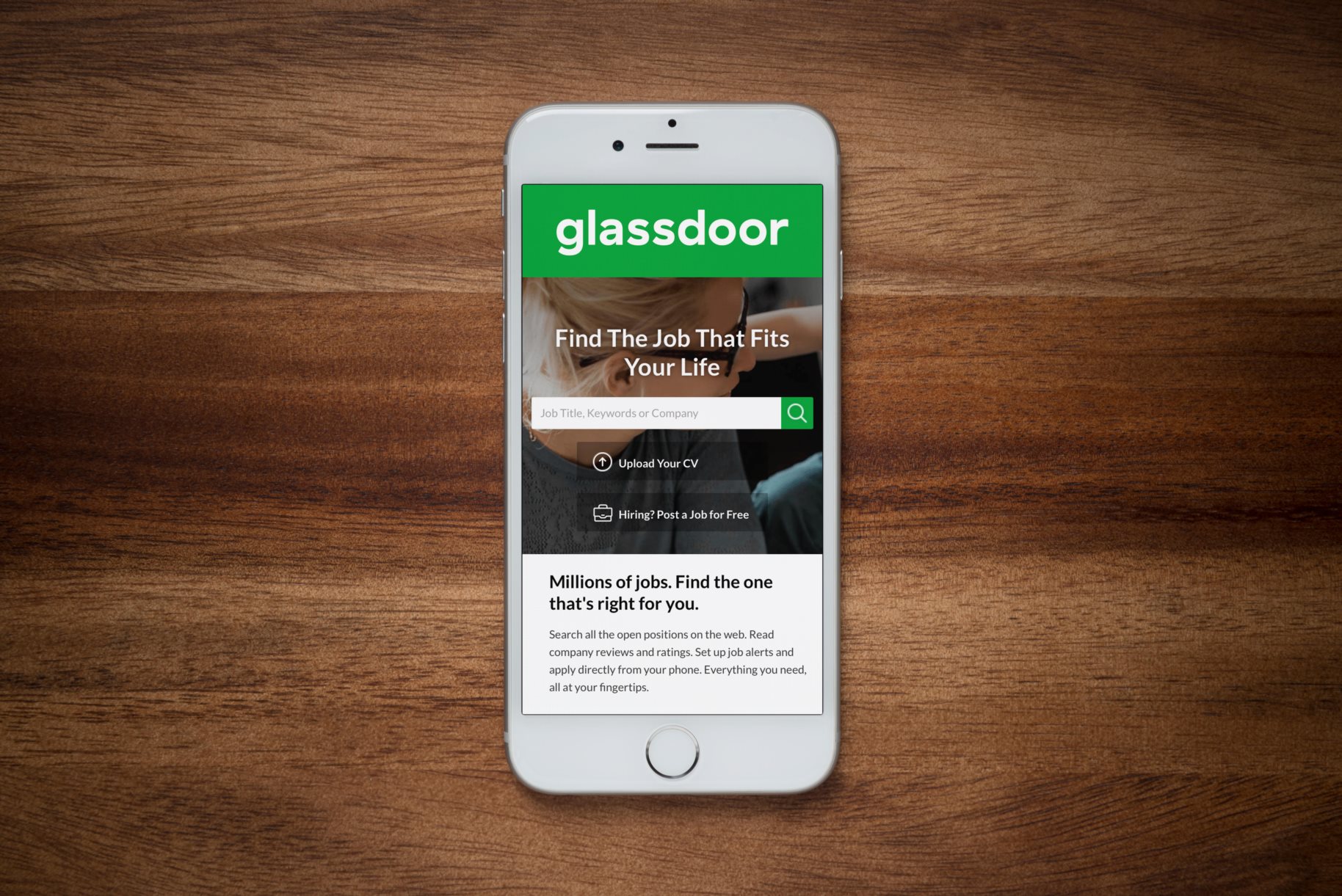recent
Glassdoor Is Broken
In every instance there were detailed discussions about what’s missing and how to do better, delivered in a spirit of “hey, we’re not on a good path here.”

Public reviews serve an essential purpose in holding governments and institutions, stores and restaurants, and teachers and employers accountable. I fully and enthusiastically support transparency, including for private companies like my own. The problem is that literally anyone can lob a reputational bomb online, and it can be as devastating (and career-threatening) as any other kind of exploitive or maliciously opportunistic behavior, including those of unsavory leaders who deserve exposure.
Amida Technology Solutions, of which I was a co-founder and where I still serve as CEO, is a 50-person data-management software company, based in Washington D.C. that specializes in health information. I started Amida on my kitchen table in 2013 with two members of the inaugural class of Presidential Innovation Fellows, and raised money from first-tier investors three years later. We grew by 50 percent in 2018 and faster still in 2019. The coming year looks promising. Anyone who has ever started a company from scratch, or made an early-stage investment, would find our nascent success unusual, if not remarkable.
Inevitably, over the years I’ve occasionally had to make tough decisions about letting people go. In every instance there were detailed discussions about what’s missing and how to do better, delivered in a spirit of “hey, we’re not on a good path here.” But no matter how it is packaged, letting people go sucks. It is rough on the employer (because there are often personal relationships involved, and because the position needs to be re-filled) and it is, tautologically, terrible for the employee. And because these discussions need to be private and discreet, such decisions can be a shock to the rest of the team. In such a situation, a well-intentioned website like Glassdoor—a platform on which employees can post anonymous reviews of their present or former companies and employers—can become a repository for bitterness, resentment, and frustration.
We now know that web-based argument unleashes low-brained aggression, replete with language and behavior that are mostly modulated in live exchanges. Jack Dorsey recently observed that platforms like Twitter make it “super-easy to harass and abuse others” using manipulation and disinformation at scale. These, Dorsey confessed, are “dynamics we were not expecting.” This particularly destructive virus of societal DNA now extends to the workplace. Sometimes, a soon-to-be former employee will negotiate a generous severance, even ask for a recommendation, or pretend that this is merely a low point in an otherwise good relationship, just before they (or an outraged colleague) write a scathing denunciation on Glassdoor.
Of course, whistleblowing is as American as apple pie, and we need to protect vulnerable people who report wrongdoing from retribution and retaliation. In his bestselling book Bad Blood, John Carreyrou revealed that the then-president of Theranos successfully demanded Glassdoor remove harsh reviews about him. There are two obvious problems here: First, $700 million can buy a lot of manipulated media (as it did for Theranos—we raised 99.3 percent less than that). Second, in that particular instance the criticisms were, in hindsight, on the mark. The difference is that their executive was secretive and abrasive; most senior leaders are open, at least internally, because that’s the best way to build trust, loyalty, and commitment in any relationship.
Like most executives, I struggle with the difficult and ubiquitous tensions between work quality and employee turnover, contractual urgency and creative thoughtfulness, and superficial transactional relationships and authentic enduring ones based on shared values, reciprocal commitment, and patience. I still seek a graceful way to navigate the harshness of today’s public rhetoric and misaligned expectations that demand instant allegiance (or faceless assignment) to a tribe. I strive to avoid the echo chamber of self-reinforcing views born of perception and feelings instead of perspective and fact.
At Amida, we openly invite people to bring up their concerns at interviews and performance reviews. We don’t share salaries or equity holdings (except mine), but practically everything else is freely available. Some diligent and brave folks do ask us about our Glassdoor reviews. Sometimes they report their questions are well answered, sometimes the feedback is wan, but I am always grateful for an opportunity to make the case for excellence and integrity. After the first few defamatory Glassdoor reviews were posted, I internally published a policy about identity bias, in which I wrote:
If there are current or future team members who, based on rumor, isolated incident, innuendo, or perception believe that there is a (concealed) systemic pattern of deliberate subjugation, then we will assume a fundamental disconnect between leadership’s values and theirs.
Fact-based criticisms and hopefully rare violations will be addressed on a case-by-case basis, as they have been since the inception of the company. We have performance-measurable zero tolerance for discrimination and prejudice; so too will we have short patience for individuals who approach subordinates, peers, and managers with jaundiced presumption and chronic doubt of their true intentions.
We then had several externally facilitated, compulsory, and company-wide discussions about implicit bias and deliberate inclusion. There was nearly unanimous agreement—from the most aggrieved to the most cynical—that these sessions raised awareness and reinforced both our expectations and values. Yet they were insufficient to turn the tide, and the Glassdoor reviews became more vituperative, destructive, and vindictive. It is difficult not to take such attacks personally. I’ve also read the reviews of other CEOs I admire and respect, and think to myself “that’s ridiculous” or “that’s hilarious,” knowing that they fume about theirs like I (used to) fume about mine. Anonymous criticisms from unvalidated sources are objectively not the best way to get cultural input about a young company.
As Meghan Daum writes in The Problem with Everything, many attention-seeking posts on Facebook and Twitter confuse call-outs and in-group preening with actual progress, and celebrate victimization as a coveted status. When there is 3.5 percent unemployment, fragile response to criticism, higher trust in emotion over intent or outcome, and latent mistrust of management (however unfair or misguided), people are going to complain. If an employee’s work product has deficiencies, and if they incessantly clash with colleagues, and if they reflexively connect coaching or warning to condescension or identity bias, then they are probably not a good fit for any workforce.

Quoting Heather Heying, Daum wrote “We can’t make things better without first establishing what’s true.” And a lot of web-enabled screed is perversely untrue, hostage to a mentality in which ends justify all means. Disagreement about what we want—progress towards a truly free, just, and equitable society—is being conflated with discussion on how we best achieve it. Ferocity can blind activists to the very people who might otherwise stand with them; their righteousness squelches discussion, exploration, persuasion, and debate. The new digerati convict and cancel in a kangaroo court of tweeted public opinion and anonymous reviews, a speedy way to obviate a lot of messy details, context, reflection, and understanding.
As Roger McNamee argued in Zucked, when respect for other viewpoints is absent and there is no willingness to engage, the possibility for compromise evaporates. Institutionalized promotion of hypersensitivity to the perceived impact of disagreement, which begins in our schools, is a destructive social pathogen. Referring to YouTube, Twitter, and Google, McNamee wrote, “The design of these platforms makes them susceptible to exploitation.” There is no recourse, no learning, and no consequence to the immiserated nameless if they are wrong, never mind insincere.
Heather Mac Donald has written that any leader who “wants to prepare students for an objective relationship to reality would seek to convey that truth.” Some self-identified progressive universities have dismissed or censured faculty who were merely accused of even minor infractions of cultural insensitivity, regardless of their intent (the individuals cited by Daum, Mac Donald, and Jonathan Haidt clearly strove, no matter how imperfectly, for inclusivity). In fact, the most egregious institutional betrayals occurred when the instructors in question were explicit and clear that their outreach was designed to bridge gaps—in perception or in convention—and their celebrated public track records of scholarship and service would easily refute even the mildest suspicion of implicit identity bigotry or discrimination.
One of my many Glassdoor-memorialized experiences with such rigidity is well captured by a contentious conversation with an employee who rejected any notion of a constructive academic-like argument; their retort was that they “found their truth in the Bible.” There was no possibility to discuss or explore the difference between ancient theological precepts and the character of the technical, commercial, quality, and design truths I thought we should be pursuing together. I was subsequently accused, in an anonymous post, of canceling their agency and voting for President Trump. Here is what I wish I had said, harvested directly from Haidt:
Sages in many societies have converged on the insight that feelings are always compelling but not always reliable. Often they distort reality, deprive us of insight, and needlessly damage our relationships. Happiness, maturity, and even enlightenment require us to reject the Untruth of Emotional Reasoning and learning and instead to question our feelings. The feelings themselves are real, and sometimes they alert us to truths that our conscious mind has not noticed, but sometimes they lead us astray.
The sharp edges between background and experience, credentials and perspectives, religiosity and atheism, ethics and culture, and gender and race, will inevitably puncture the anodyne bubble of the aggrieved online. At some point, the digerati will realize that their fleeting endorphic satisfaction actually changes nothing of lasting value; it hurts our cause far more than it helps it. The drapery of digital oppression blocks the sunshine that reveals frail thinking and addictive habits like obsessively checking “likes.” No less an authority than President Obama suggested call-out culture is something we should get over quickly.
During a conversation at the University of Chicago in 2017, the American broadcaster and commentator Van Jones said this:
There is a [new] view that I think is ascendant, which I think is a horrible view, which is that “I need to be safe ideologically. I need to be safe emotionally. I just need to feel good all the time, and if someone says something that I don’t like, that’s a problem for everybody else.” … I don’t want you to be safe ideologically. I don’t want you to be safe emotionally. I want you to be strong. That’s different [to physical safety]. I’m not going to pave the jungle for you. Put on some boots, and learn how to deal with adversity. I am not going to take all the weights out of the gym; that’s the whole point of the gym. This is the gym.
Perhaps at Amida we will be able to model and teach the giant difference between actual humiliation and the discomfort produced by a difficult (albeit objective) evaluation. Perhaps we will be able to model and teach a maturity that differentiates real problems from trivial ones. Perhaps we will be able to focus the lens of instant offense into a more generous view of other people’s intentions, and as Haidt says, “look for nuance instead of a simplistic us-versus-them morality.”

The core principle and foundational purpose of the company is to provide employment and growth opportunities for those—especially in Washington DC, and especially for women (notoriously under-represented in tech)—who may not have otherwise considered or chosen a career path with a venture-backed high-tech company. It never once occurred to me that anyone would question my incentives, my goals, and my motives. When they did, I thought my track record—including demonstrable commitment to progressive social causes—would remedy the passing poison of anonymous disparagement and accusation. This was before institutions like Yale cracked the foundation of “inclusive leadership” by thumbing the scale of evidence-based judgment and undermining authentic debate and conversation. Stupid, I know, but there it is.
Jones, Haidt, Mac Donald, and Daum focus most of their analysis and recommendations on academe. They could have just as easily been talking about any company, any high-tech company, or my company. An acclaimed business professor recently told me that he is hearing that “hypersensitivity is flooding into the workplace.” I can confirm that with an N of 1. We are living through an unhappy age of florid mistrust and frictionless digital manipulation. Today’s leaders are the downstream stevedores of burning rafts launched at the educational headwaters of a new kind of victimization that twists good intentions into malicious exploitation. The half-life of these cultural contaminants will extend well beyond record-low unemployment; indeed, they are likely to accelerate its end.
Today, anyone with a smartphone has a platform from which to shout their grievance, no matter how legitimate or contrived. That is okay—free speech is free speech. But the no-recourse smear diminishes and compromises the legitimacy of the complaint, the problem, the truth, and our (collective) reconciliation. This counterfeit heroism is the opposite of Zola’s J’Accuse illumination of the Dreyfus affair. First, he put his name to it. Second, he exposed a lie and an injustice. Third, he was ready to suffer the consequences that come with speaking uncomfortable truths (which were severe). The use, utility, and benefit of public websites are diluted, on the other hand, by the baked-in assumption that the unnamed employee (or consumer, or advocate, or student, or voter) is authentic, innocent, and subjugated. As long as the proprietors of social media connive to broaden the definitions of assault and transgression, readers will always find something new to be offended by. Ironically, like the fascists and authoritarians they profess to oppose, that is their business model.
But their reliance on First Amendment freedoms protects no one, least of all the victims of exploitation, discrimination, and injury. The empty applause for performative outrage is unmoored from fact and reality, and like any addiction, it can be lethally dangerous. The virtual and the corporeal have collided, as evidenced by melting glaciers, manipulated elections, and the (attempted) murder of good reputations. Channeling Mac Donald, and congruent with my weekly admonition of “doing stuff that matters with people you care about,” I want teammates in all sincerity to say:
This is one of the world’s most enviable companies, whose technological splendors lie open and unrestricted to all its colleagues. We may never again have a position that connects such a rich experience, and professional exposure, to positive impact on society. We should exploit the privilege, we should exploit the opportunity. We are supervised by well-meaning, compassionate leaders whose highest purpose is our long-term interests, and who only want the company to thrive. We should study, write, code, and immerse ourselves in the knowledge that surrounds us. We should apply ourselves with everything we have, so that we, too, can be even better prepared for an intellectually rich and commercially productive life.
In other words, objective truth, social justice, and spiritual growth are and must be our most noble aspirations. Platforms like Glassdoor amplify an open microphone used to promote tension, exploitation, and manufactured conflict. It is in all our interests to recognize that and compel sites like this to repair the damage they cause and continue to create. Their technology attracts real attention to artificial depravities, at the compounding cost of diminished joy, unfulfilled excellence, and muted impact.
This kind of social media brings out the worst in us. It enables contributors to hide behind a thin veil of synthesized oppression, because their policies indemnify the hosts from truth. Moreover their income is fueled by fear disguised as prudence, and unhinged outrage masquerading as a dutiful warning. We should resist the temptations and reflexes that irrationally destroy beauty—of proven ideas, of altruism, of trust—because of misplaced ideologies to which we are all vulnerable, insecurities we all share, and ambitions we all harbor.
Truth, justice, and growth all require real engagement and actual dialog, the antithesis of click-by shootings committed by gangs of the discontented. Even a meager attempt at validation and authenticity would help to decelerate the spread of anerobic dead zones full of the dumped garbage they collect and curate for profit.






